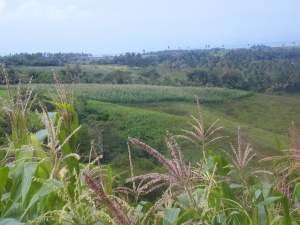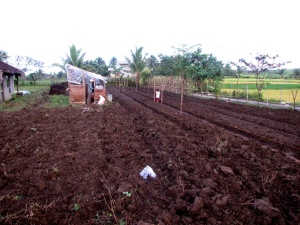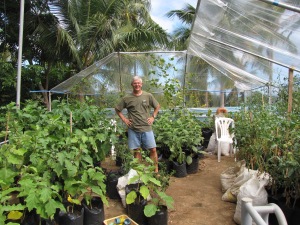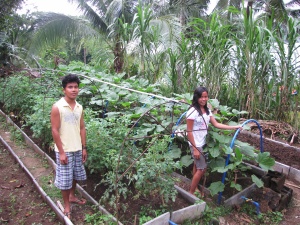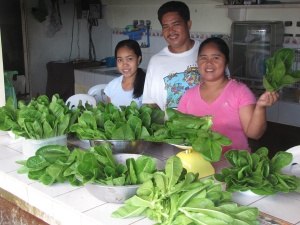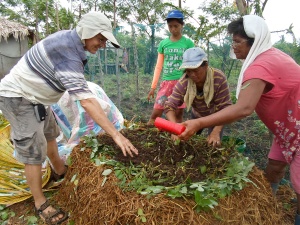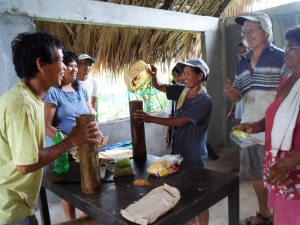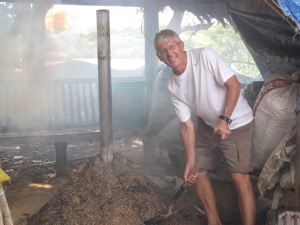“How could there be so much land and yet so many people struggling to eat!” This was one of the first ironies that met me when I arrived on San Miguel Island many years ago. Tropical paradise and yet people were surviving on rice and a couple small fish for their meals.
The answer to my question was furnished by the people themselves. There was agriculture, they told me, but it was mostly cash crops like corn, cassava, and komote (sweet potato), none of which were really useful for the daily diet of the people on the island. Some planted gardens, but with the difficulty with poor soil, torrential rainfall, blistering heat, and a collection of bugs so vast that it would make any entomologist jealous, veggies hardly stood a chance!
In addition, the large fields, I was told, were “nourished” primarily with synthetic fertilizers, spayed with toxic insecticides, and that, with no return of organic materials to the fields, was leading to an increasingly hard and acidic soil. This in turn was clearly resulting in more and more crop failures, financial difficulty for the people, and an exodus of some families from an island — and island which properly managed, should have been able to support many more people than it was.
Seeing the effect of this on the financial stability and health of people in the church led us to start plowing into a new agricultural development ministry. The hope was that in some small way we could help alleviate or reverse this downward agricultural spiral – at least for some.
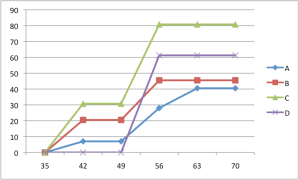
One disipline we still maintain with all plantings is to try to keep careful records of harvests. In this way we are trying to learn the best ways to plant. This is a sample of 4 ways of planting pechay, a popular lettuce type green
During the first couple years, our agricultural push – which was primarily organically focused – had a lot of ups and downs. We had a good first year harvest and data collection, but then we ran short of staff to maintain it. As much as we could, however, we pressed on, and we learned a lot.
One of the things we did learn was that, with proper management, we could in many cases double – and sometimes even quadruple – normal vegetable harvests on the island!
On a small scale we could harvest per land area a crop 20-50 x the value of the traditional farming on the island – numbers almost so unbelievable they made me go back more than once to check if I hadn’t hit a few wrong buttons on the calculator.
Because of these good results, this year we are still plowing. In fact 2012 has been a somewhat eventful for our agricultural push. Even though this has been one of the busiest times for other ministry, we have seen God help us make several significant strides forward in agriculture:
First, we were able to maintain a relatively consistent harvest from our campsite. One of the reasons is that each of our youth interns was required as part of their internship to plant at least one small garden. We showed them the ways to do it organically, and many really got into it!
For much of this time, all gardening was only done after ministry hours, and yet we reached a point where all available plots on our campsite were taken. Some of our planting was actually ministry planting, one of the main being a crop of romain lettuce which. When we sold this to contacts on the mainland, we were actually able to make as much profit in 160 ft2 as farmers here make on over 1/2 acre with a good corn harvest (In metric that is as much in 15 m2 as in 1/4 hectare)!
These past months I was also blessed by the chance to enroll online in an Organic Agricultural class offered through the University of the Philippines. This could not have been better timed, and has proven an invaluable resource in getting a better grip on planting organically.
While taking this class, the Lord opened yet another door for me to start training seven families in the church on the ins and outs of organic agriculture.
For so many years I have wanted to do this, but only now the opportunity has opened up. One of the benefits of taking the training was that each family had the chance to start their own organic garden in order to apply the concepts being taught.
In order to help them get going, the Lord prompted a dear brother in the US to offer a budget for each family to help them get the necessary equipment for building their gardens. Equipment like shovels, hoes, netting, and water cans were among the supplies that we have been able to provide as a result.
In addition to this, we have also experimented with fabricating our own low-cost cement blocks to create raised beds, metal frames to help protect the crops from the upcoming torrential rains, and offered soil testing to determine what homemade organic materials or fertilizers to add to their soil.
We’ve all learned together how to make carbonized rice hulls for conditioning the rock hard clay soil, fermented plant juice to stimulate plant growth, and vermicompost-tea to give the plants a nutrient and microbial burst. It’s been a huge amount of fun besides serving a big purpose in helping a few families take their first steps toward better self-sustainability.
I still consider myself an neophyte when it comes to organic agriculture, but I am trying to sow what I know, believing it will also lead to a harvest of more expertise. My hope and prayer is that this will catch on, causing more families getting interested, as well as motivate those who have already started the training to expand the practices to larger and larger areas. Please pray for that!
It’s a lot of work to plant, and there are a lot of obstacles to good harvests. However, with God help, we plow on in hopes of a golden harvest.
